unit two
Unit Two 知识点讲解
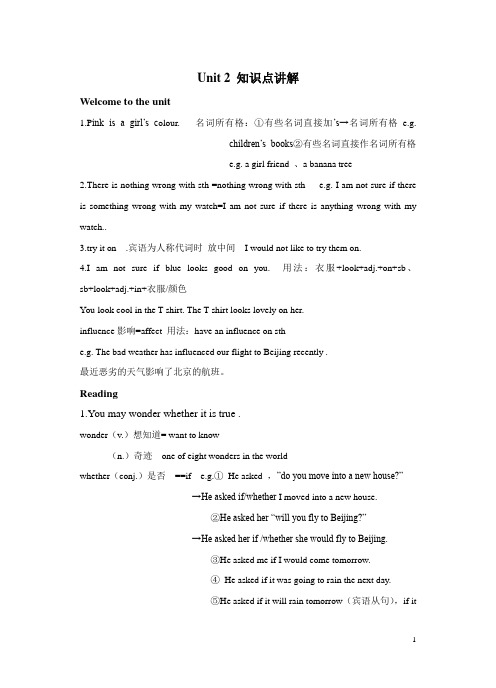
Unit 2 知识点讲解Welcome to the unit1.P ink is a girl‟s c olour. 名词所有格:①有些名词直接加‟s→名词所有格 e.g.children‟s books②有些名词直接作名词所有格e.g. a girl friend 、a banana tree2.There is nothing wrong with sth =nothing wrong with sth e.g. I am not sure if there is something wrong with my watch=I am not sure if there is anything wrong with my watch..3.try it on .宾语为人称代词时放中间I would not like to try them on.4.I am not sure if blue looks good on you. 用法:衣服+look+adj.+on+sb、sb+look+adj.+in+衣服/颜色You look cool in the T-shirt. The T-shirt looks lovely on her.influence影响=affect 用法:have an influence on sthe.g. The bad weather has influenced our flight to Beijing recently .最近恶劣的天气影响了北京的航班。
Reading1.You may wonder whether it is true .wonder(v.)想知道= want to know(n.)奇迹one of eight wonders in the worldwhether(conj.)是否==if e.g.①He asked ,”do you move into a new house?”→He asked if/whether I moved into a new house.②He asked her “will you fly to Beijing?”→He asked her if /whether she would fly to Beijing.③He asked me if I would come tomorrow.④He asked if it was going to rain the next day.⑤He asked if it will rain tomorrow(宾语从句),if itrains tomorrow(状语从句),he won‟t go.注意:如果,从句中有or not 连词,只能用whether …or not,不用if 。
Unit Two笔记
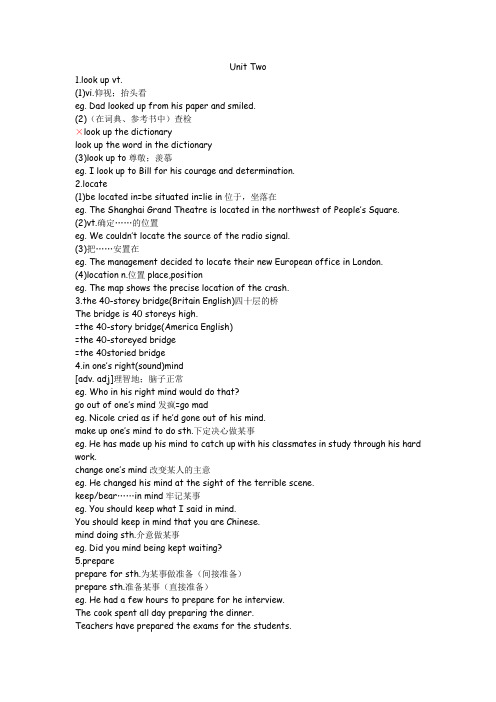
Unit Two1.look up vt.(1)vi.仰视;抬头看eg. Dad looked up from his paper and smiled.(2)(在词典、参考书中)查检×look up the dictionarylook up the word in the dictionary(3)look up to尊敬;羡慕eg. I look up to Bill for his courage and determination.2.locate(1)be located in=be situated in=lie in位于,坐落在eg. The Shanghai Grand Theatre is located in the northwest of People’s Square. (2)vt.确定……的位置eg. We couldn’t locate the source of the radio signal.(3)把……安置在eg. The management decided to locate their new European office in London.(4)location n.位置place,positioneg. The map shows the precise location of the crash.3.the 40-storey bridge(Britain English)四十层的桥The bridge is 40 storeys high.=the 40-story bridge(America English)=the 40-storeyed bridge=the 40storied bridge4.in one’s right(sound)mind[adv. adj]理智地;脑子正常eg. Who in his right mind would do that?go out of one’s mind发疯=go madeg. Nicole cried as if he’d gone out of his mind.make up one’s mind to do sth.下定决心做某事eg. He has made up his mind to catch up with his classmates in study through his hard work.change one’s mind改变某人的主意eg. He changed his mind at the sight of the terrible scene.keep/bear……in mind牢记某事eg. You should keep what I said in mind.You should keep in mind that you are Chinese.mind doing sth.介意做某事eg. Did you mind being kept waiting?5.prepareprepare for sth.为某事做准备(间接准备)prepare sth.准备某事(直接准备)eg. He had a few hours to prepare for he interview.The cook spent all day preparing the dinner.Teachers have prepared the exams for the students.be prepared for做好准备来迎接eg. I wasn’t prepared for all their questions.be prepared to do sth.做好准备来做某事eg. You have to be prepared to take risks.6.belongings n.(pl.)所有物;财产eg. Don’t forget your belongings when you get off.He left all his belongings to his brother.a sense of belongings归属感belong to(无被动语态,无进行式)eg. Does this book belong to you?Two-thirds of them belong to the golf club.Who does this book belong to?7.change v./n.change into……换上衣服;变成eg. She changed into her swimsuit.When the princess kissed the beast, it changed into a handsome prince. change A into B=turn A into B 把A变成Beg. His sickness changed him into a miserable demanding old man. Change A for B 把A换成B(=exchange)eg. You’d better change that shirt for a large one.Change for the better变好eg. The patient’s condition has changed fot the better.Change with…随着…的变化而变化eg. The price changes with the supply and demand of the market.a changing world不断变化的世界8.expect v.期待;希望;预计expect sb. to do sth.期待/意料某人做某事eg. He expected you to finish the work by March.He expected there to be a heated discussion about the issue.expect sth. of sb.期望从某人处得到……expect good service of the local bankeg. All the students expect praise of their teachers.expect a lot(too much) of sb.对某人要求过高as is expected正如所预料的eg. As is expected, she has published a book specially for children. expectation n.期待;希望;预计beyond one’s expectation(s)出乎意料eg. The result of his historical research was well beyond expectation. contrary to one’s expectation(s)和预料相反eg. Contrary to his expectation, the craftsman were well received. live up to one’s expectation(s)符合某人的期望eg. Your performance doesn’t live up to my expectation.9.speed v.(speeded/sped)speed by: pass quickly快速驶过(1)快速前进eg. The three men jumped into a car and sped away.(2)加速,促进speed up/speed sth. up加快速度eg. The train soon sped up.speed up production【n.】速度at full/top speed以全速at the/a speed of以……的速度eg. He drove at a speed by fifty kilometres.10. come into view/sighteg. The river came into view as we turned the corner.view(从远处、高处、窗口看到的)景色,风景eg. The view from the top of the tower was breathtaking.(phr.) a bird’s eye vieweg. From the plane, we had a bird’s eye view of the city.11.approach v./n.(1)vt./vi接近,临近eg. As we approached the lamp, I saw a man coming to us.I find him easy to approach.平易近人(=approachable)The mid-term exam is approaching.(coming,drawing near,around the corner)(2)【n.】入门;通往的道路(处理问题的)方法the approach to+n./doing……的方法;通往……的道路eg. The only approach to the ancient castle is a narrow path.There is no easy approach to (learning) mathematics.(比较:the way,method,means)with the approach of……随着……的临近12.extend v.伸出;延长;延伸eg. He extended both his hands to beg for money.The plateau extends for many miles.The teacher decided to extend out test time because the paper was too difficult. extend one’s welcome/thanks to do欢迎、感谢某人eg. The English-speaking people extended a warm welcome to the astronaut. extension n.伸展,延长;扩大,电话分机extensive adj.extensive reading泛读(cf: intensive reading精读)eg. He reads books extensively, and knows a lot about the history of ancient Greece.13.in all directions向四面八方eg. When the police arrived, the crowd ran away in all directions.in the direction of朝……方面Tom went off in the direction of the post office.sense of direction方向感I have no sense of direction.under the dirction of sb.在某人指挥下Our company is under the direction of the manager.You have to read the directions on the bottle before taking drugs. 解释,说明;指南,指引(pl.)14.except;besideeg. Everyone is present except/but Tom.(把Tom真正地除掉) Except for Tom, everyone is present.(美中不足)Besides English, he speaks German.(不是真正地除掉,除了…还有) 15.proud adj. pride n. pride v.be proud of b./sth. adj.eg. Her parentsare very proud of her.You should be proud of yourself.take pride in sth. n.对…感到骄傲eg. The carpenter took pride in his progress in chemistry.He takes great pride in his children’s achievements.Pride comes/goes before a fall.pride oneself on/upon sth. vt.对…很骄傲She prides herself on her knowledge of home decoration.16.instant n.时刻(1)【n.】=momenteg. I’ll be back in an instant.for an instant就一会儿(2)The instant+句子一……就=as soon as……=the moment(3)adj. 即食的instant soup/coffee.an instant success.【语法】动名词的完成时A.Subject主语eg. Selling fake medicine is a serious crime.Studying abroad is extremely difficult in the first few months. Seeing is believing.眼见为实B.Predicative表语eg. My job is teaching English.Our task is studing.C.Object宾语eg. I don’t like reading novels.I reemember meeting/having met him somewhere before.D.Appositive同谓语eg. My habit, doing some reading at night, remains unchanged.E.Attributive宾语eg. Everybody was at his fighting post.They set up an operating table.以下动词及动词词组后面通常接动名词:admit, advise, advoid, consider, delay, deny, dislike, doubt, enjoy, escape, ensure, fancy, finish, imagine, include, keep, mind, miss, postpone, practise, resist, risk, stop, suggest, give up, keep from, put off.。
四年级UnitTwo英语教案
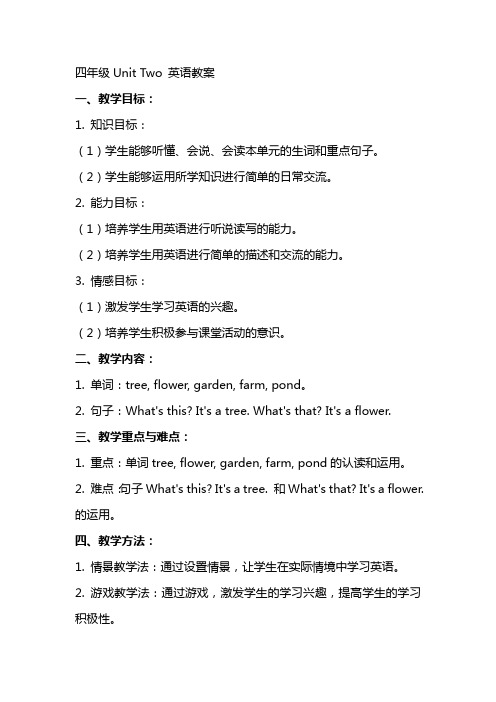
四年级Unit Two 英语教案一、教学目标:1. 知识目标:(1)学生能够听懂、会说、会读本单元的生词和重点句子。
(2)学生能够运用所学知识进行简单的日常交流。
2. 能力目标:(1)培养学生用英语进行听说读写的能力。
(2)培养学生用英语进行简单的描述和交流的能力。
3. 情感目标:(1)激发学生学习英语的兴趣。
(2)培养学生积极参与课堂活动的意识。
二、教学内容:1. 单词:tree, flower, garden, farm, pond。
2. 句子:What's this? It's a tree. What's that? It's a flower.三、教学重点与难点:1. 重点:单词tree, flower, garden, farm, pond的认读和运用。
2. 难点:句子What's this? It's a tree. 和What's that? It's a flower. 的运用。
四、教学方法:1. 情景教学法:通过设置情景,让学生在实际情境中学习英语。
2. 游戏教学法:通过游戏,激发学生的学习兴趣,提高学生的学习积极性。
3. 互动教学法:引导学生积极参与课堂活动,培养学生的口语表达能力。
五、教学步骤:1. 热身(5分钟)(1)师生问候,导入新课。
(2)唱一首英文歌曲,调动学生的学习氛围。
2. 课堂导入(10分钟)(1)教师展示图片,引导学生说出单词:tree, flower, garden, farm, pond。
(2)学生跟读,巩固单词。
3. 情境教学(10分钟)(1)教师设置情景,引导学生用英语进行交流。
(2)学生分组进行角色扮演,练习句子:What's this? It's a tree. 和What's that? It's a flower.4. 游戏教学(10分钟)(1)教师组织学生进行单词接龙游戏。
Unit Two 翻译技巧-省译法

多年来的军队生涯,那里总是有一定的标准和规则;年轻人尊敬上级, (……)发出命令,人人遵守,同样的制服就意味着(……)站在同一边。
1.2 省略做宾语的代词
英语中有些作宾语的代词,不管前面是否有提到过,翻译时往往可以 省略。 The more he tried to hide warts, the more he revealed them. 他越是要掩盖他的烂疮疤,就越是会暴露 (……)。 2)She laid her hand lightly on his arm as if to thank him for it. 她轻轻地把手放在他的胳膊上,好象表示感谢(……)。 3)In fact, Hitler’s “blitz” carried him so far, to the very gate of Leningrad by September, a city he was never to seize. 事实上希特勒所进行的“闪电战”曾(……)深入苏境,九月份已直逼列 宁格勒-------一座他始终未能攻陷的城市。
2)If I had known it, I would not have joined in it. 早知如此,我就不参加了。
unit two
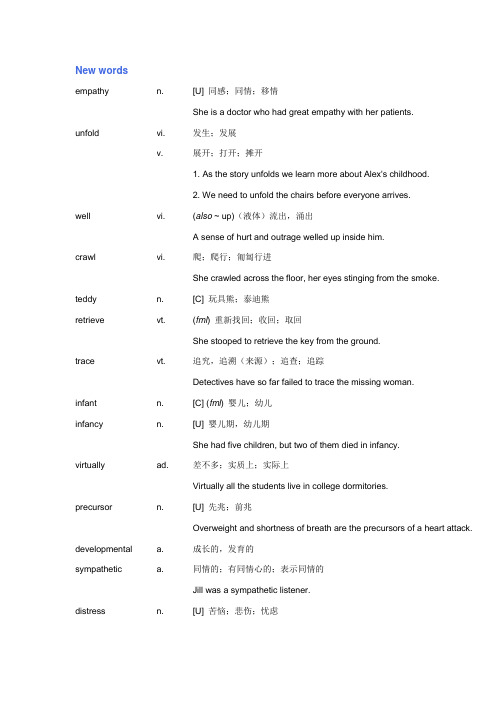
New wordsempathy n. [U] 同感;同情;移情She is a doctor who had great empathy with her patients.unfold vi. 发生;发展v. 展开;打开;摊开1. As the story unfolds we learn more about Alex's childhood.2. We need to unfold the chairs before everyone arrives.well vi. (also ~ up)(液体)流出,涌出A sense of hurt and outrage welled up inside him.crawl vi. 爬;爬行;匍匐行进She crawled across the floor, her eyes stinging from the smoke.teddy n. [C] 玩具熊;泰迪熊retrieve vt. (fml) 重新找回;收回;取回She stooped to retrieve the key from the ground.trace vt. 追究,追溯(来源);追查;追踪Detectives have so far failed to trace the missing woman.infant n. [C] (fml) 婴儿;幼儿infancy n. [U] 婴儿期,幼儿期She had five children, but two of them died in infancy.virtually ad. 差不多;实质上;实际上Virtually all the students live in college dormitories.precursor n. [U] 先兆;前兆Overweight and shortness of breath are the precursors of a heart attack. developmental a. 成长的,发育的sympathetic a. 同情的;有同情心的;表示同情的Jill was a sympathetic listener.distress n. [U] 苦恼;悲伤;忧虑Luke's behaviour caused his parents great distress.disturbance n. [C] 造成干扰的事物;干扰The noise of the traffic is a continual disturbance.misery n. [U] 苦恼;痛苦;苦难The cold increased the misery of the people in the earthquake region.imitate vt. 模仿(某人的动作、言语或行为)He made the children laugh by initating monkey.imitation n. [C, U] 模仿Children learn a lot by imitation.comprehend v. (fml) 理解;领会How could you possibly comprehend the difficulties of my situation?mimicry n. [U] 模仿;模仿能力evoke vt. (fml) 使人想起;唤起(感情、想法或记忆)The recent flood evoked memories of the great flood of 1972.distinct a. (~ from) 有区别的;不同的;单独的The region's linguistic and cultural identity is quite distinct from that of the rest ocountry.plight n. [C] 困境;苦境She felt sad at the plight of those who are homeless.repertoire n. [C] 全部技能(或才能)the behavioural repertoire of newborn infantscookie n. [C] (AmE) 小甜饼;曲奇饼stroke vt. (用手)轻抚,抚摸She stroked his hair as he gradually fell asleep.pat vt. 平拍,轻拍(以示关心或抚慰)He patted the girl on the shoulder in an attempt to comfort her.toddler n. [C] 学步的小孩diverge vi. (~ from) 相异,出现分歧Their views on foreign policy diverge from ours.overall a. 总的,整体的Progress is being made, but the overall impression is still one of chaos. sensitivity n. [U] (~ to)(天生的)悟性,敏感The drug can cause sensitivity to sunlight.keenly ad. 敏锐地He keenly realized that actions must be taken at once.empathic a. (also empathetic)移情的;有同感的;产生共鸣的He was very empathic about what the people were suffering there. discipline vt. 训练;训导The strikers were disciplined by management.misbehavior n. [U] (AmE) 不正当举止;粗鲁行为She was annoyed by his misbehaviour at the party.naughty a. (儿童)不听话的;顽皮的;淘气的He is a naughty boy.Phrases and expressionsapart from 除……之外I hardly know anyone in the town apart from William and you.stem from 源于;是……的缘故His popularity stemmed from the fact that he was born in the area. pull away 1. 闪避;躲开2.(车辆或司机)开走1. When he tried to kiss her, she pulled away from him.2. The car pulled away from the station and disappeared at the corner.calm down (使)平静下来;(使)镇定下来She finally calmed down and fell asleep.tune out (mainly AmE, very infml) 不注意;不理睬I just tune out and let Chrissie take over.Proper namesHope 霍普(人名)Michael 迈克尔(人名)Paul 保罗(人名)Martin L. Hoffman 马丁• L. 霍夫曼(纽约大学心理学教授)E. B. Titchener 铁钦纳(1867–1927,美国心理学家)Jenny 珍妮(人名)Marian Radke-Yarrow 玛丽安•拉德克-亚罗(1918–2007,美国儿童心理学家)Carolyn Zahn-Waxler 卡罗琳•察恩-瓦克斯勒(美国儿童心理学家)National Institute of Mental美国国家心理健康研究所HealthNew wordsscary a. 骇人的;引起惊恐的This is really a scary story.tasteful a. 有鉴赏力的,趣味高雅的We are impressed by the simple but tasteful arrangement of flowers. salesperson n. [C] (尤指辗转各地的)销售员;推销员offensive a. 冒犯的;使人不快的There were complaints that the advertisement was offensive to women.automatically ad. 自动地It just automatically said "yes".consolidate vt. 加强;巩固The President is trying to consolidate his position by passing the bill.current a. (usu before noun) 现行的;当前的There are several reasons for the current political situation.ethical a. 道德的;合乎道德的I object to the war for ethical reasons.terrorist n. [C] 恐怖分子weapon n. [C] 武器;兵器globally ad. 全球地;全世界地The new investment will enable the company to compete globally.friction n. 1. [C, U] 不和;分歧2. [U] 摩擦;摩擦力1. Restrictions on trade have caused friction between the two nations.2. Heat can be produced by friction.commerce n. [U] 商业;贸易Measures are being taken to promote local industry and commerce.extract vt. (~ sth from sb / sth) 设法获取;强索It was not easy to extract information from the Senator.unauthorized a. 未经授权的;未经许可的This is a new unauthorized biography of the President.perpetrate vt. (fml) 犯(罪行、错误等);施行(欺骗、谋杀等)The military perpetrated many human rights abuses during the earliest phase oconflict.widely ad. 广泛地;普遍地It's widely expected that the mayor will make an announcement this morning.correlate v. (fml)(使)相关;(使)关联The two issues do not correlate to each other.identifier n. [C] 标识符,识别符Our ID card is one of our identifiers.instance n. [C] 例子;实例I have not found a single instance where someone was actually denied their rigvote.undoubted a. 无疑的;无可争辩的The show was an undoubted success.peril n. [U] (mainly literary) (in ~) 危险,险事We pray for those in peril on sea.Phrases and expressionsall the time 一直;始终It's a very good restaurant; we go there all the time.go about sth 着手做;干There were no further reports of voilence in the town, and most people wetheir daily activities as usual.on file 存档;被记录下来备查We have all your details on file.a good / great deal 大量;非常,及其She spent a good deal of time on the project.sooner or later 迟早;终归The whole thing was going to reach crisis point sooner or later.not to mention 更不必说;除……外(还)The weather here is gorgeous, not to mention the wonderful food.if only 真希望;要是……就好了If only we could afford to buy a place of our own.Proper namesAmazon 亚马逊公司(美国最大的在线零售商)New wordssample n. [C] 样品;试样publicity n. [U] (杂志、报纸或电视的)关注,报道,宣传significantly ad. 1. 显著地;相当数量地2. 有实际意义地;有重要影响地mainly ad. 大部分地;主要地prosecute v. 对……提起诉讼;起诉sue v. (通常为索赔而)起诉;控告;对……提起诉讼Proper namesInnsbruck 因斯布鲁克(奥地利城市名)Napster 奈普斯特(网站名)Kazaa 卡杂(网站名)Brianna LaHara 布里安娜•拉哈拉(人名)Minnesota 明尼苏达州(美国州名)Norwich 诺里奇(英国城市名)。
Unit_two(英语2在线答案)
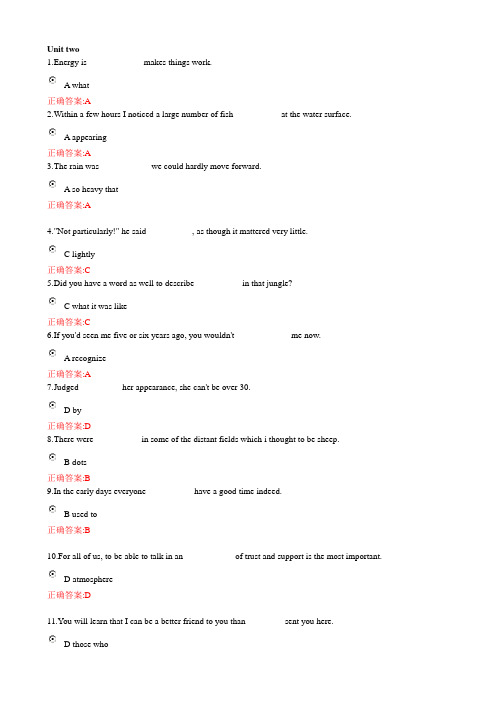
1.Energy is ____________ makes things work.A what正确答案:A2.Within a few hours I noticed a large number of fish __________ at the water surface.A appearing正确答案:A3.The rain was ___________ we could hardly move forward.A so heavy that正确答案:A4."Not particularly!" he said __________, as though it mattered very little.C lightly正确答案:C5.Did you have a word as well to describe __________ in that jungle?C what it was like正确答案:C6.If you'd seen me five or six years ago, you wouldn't ____________ me now.A recognize正确答案:A7.Judged _________ her appearance, she can't be over 30.D by正确答案:D8.There were __________ in some of the distant fields which i thought to be sheep.B dots正确答案:B9.In the early days everyone __________ have a good time indeed.B used to正确答案:B10.For all of us, to be able to talk in an ___________ of trust and support is the most important.D atmosphere正确答案:D11.You will learn that I can be a better friend to you than ________ sent you here.D those who12.Dad is a little _________ and needs a hearing aid.B deaf正确答案:B13.He came to Peking University _________ a visiting scholar several years ago.A as正确答案:A14.Today there is more awareness of the ____________ between food and health.B connection正确答案:B15.We have followed the trail of these people ________ find that they have moved.C only to正确答案:C16.- ___________ - Could you please consider again?D I'm afraid we can't give you that position.正确答案:D17.- That's a real letdown!My parents are not able to attend the graduation. - ___________B That's too bad. But they'll feel happy for you.正确答案:B18.- How could you screw things up (把事情搞砸) again? - ____________.D I'm sorry. It won't happen next time.正确答案:D19.- Is my illness serious? - ____________.B Don't worry. You will be well soon.正确答案:B20.- I'm afraid I cannot pass the exam. - ________.A Why not? You can do it!正确答案:A完型填空21.Money exists as a convenient tool to ____21____ the main problem associated with barter (物物交换). This problem can be generalized ____22____ the problem of find someone who both happens to have what you want and also happens to want ____23____ you have. Imagine that money does not ___24___, but baseball and baseball cards do. Imagine you want one of Bob’s baseball cards and all you have is apples. If Bob does not wantany ___25___, no trade can take place. To overcome this problem, you have to find out what Bob DOES W ANT. You must then find someone who ___26___ happens to have what Bob wants and also happens to want apples. You can then ___27___ some of your apples for the item Bob wants and then trade with Bob for his baseball cards. This process of trading for things you don’t want ___28___ you can ultimately trade for what you do want is called “Indirect Exchange.” As you might ____29____, this can take a lot of time and effort, and it will not take long before people begin searching for items that are universally (普遍的) ____20____ in trade by everybody. When this item is discovered, money is born.1.A) show B) solve C) understand D) flow2.A) by B) to C) as D) for3.A) that B) how C) which D) what4.A) exist B) happen C) discover D) create5.A) apples B) money C) barter D) baseball cards6.A) either B) neither C) both D) as well7.A) sell B) trade C) buy D) spend8.A) because B) as long as C) so that D) but9.A) complete B) hear C) remember D) imagine10.A) accepted B) missed C) agreed D) ordered正确答案:1-B, 2-C, 3-D, 4-A, 5-A, 6-C, 7-B, 8-C, 9-D, 10-A阅读理解22.1. Slow Food International, a non-profit organization, was founded in 1989. The organization aims to promote the consumption of fresh, high-quality local foods that are produced using safe practices. 2. "We believe in the pleasure of the table combined with the responsibility towards the environment, "Donna Reno, leader of Slow Food's Miami chapter (分会), said. 3. The movement began in 1986 when journalist and activist Carlo Petrini campaigned against the opening of a McDonald's at the Spanish Steps in Rome. Although Petrini's protesting (反对, 抗议) was unsuccessful, Slow Food took off these years later. 4. Petrini's movement had an effect all over the European community and now it is all over the world. 5. Slow Food has 85,000 members internationally and more than 16,000 members in the US. The organization is now attempting to work with college students to start Slow Food on-campus chapters. 6. Katy McNulty, 23, a student at the Art Institute of Pittsburgh, is currently in the process of starting a Slow Food chapter on her campus. 7. "As students, we have a lot of energy," McNulty said, "and with a huge student population it is easier to spread the word."A.Slow Food ResponsibilityB.Slow Food MovementC.Slow Food MembersD.Slow Food MiamiA. Because Donna Reno is the leader of Slow Food's Miami chapter.B. Because Donna Reno supportsPetrini's movement. C. Because it helps people to eat high-quality local foods safely. D. Because it illustrates the aim of Slow Food International.A. Succeeded.B. Flied away.C. Left hurriedly.D. Changed.A. OneB. 16,000C. NoneD. 23A. Peaceful campus.B. Experience of students.C. High consumption of students.D. Large number of student population.正确答案:1-B, 2-D, 3-A, 4-C, 5-D。
Unit Two
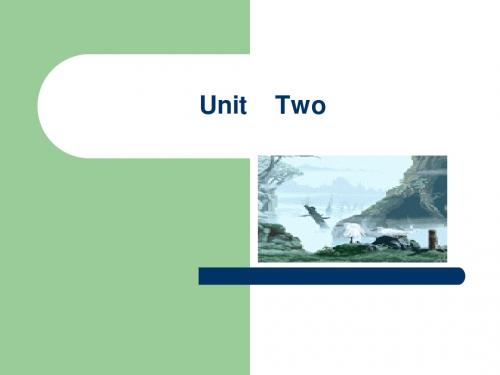
Cultural Notes of Dialogues
Huang Shan is Located in the south of Anhui Province. The scenic area covers 154 square kilometers, and is celebrated for its peaks, rocks, pines, clouds and springs. The renowned Four Wonders of Huang Shan are the spectacular rocks, oddly shaped pines, hot springs and “sea of clouds”.
Cultural Notes of Readings
3. views of Chicago
Language Points of Reading I
● She looked at me as if I had slapped her face. Slap her face Did Clive slap his mother’s face? The clause I had slapped her face after the connective as if indicates an unreal condition
● As soon as you have made up your mind, I’ll tell you what to look for and where to see them. where + to: wh-word plus to Other examples: I’ll tell you which bus to take if you want to go to the bookstore. You’d better know how to take care of yourself if you live far away from your parents.
unit two课件

• 拓展: the poor 表示贫穷的一类人, the + 形容词 • 作为集合名词词组,类似的还有: the rich ,the deaf, the blind, • the young, the old
seriously adv. 严重地,严肃地,认真地
参加(竞赛、娱乐和游戏等活动)
join in the game
参加(群众性活动、会议、劳动和游 join the meeting 街等)并起一定作用
be up to 是......的责任,由......决定
• eg: This is up to you.这件事由你决定。 • 与up相关的短语 • set up 建立 grow up 成长,长大 open up打开 • cut up 切碎 use up 用光 look up 抬头往上看,查阅 • end up 结束 catch up 追上 get up 起床
sound n.声音
• eg:The birds flew away when they heard the sound of the gun.
sound 指自然界的一切声音 He heard a strange sound. voice 人的“嗓音” The girl has a sweet voice. noise 不悦耳的噪音 Don't make any noise.
action n.行动,活动 actor/actress n.男/女演员 active adj.积极的 actively adv.积极地 activity n.活动
He took strong action. an actor/actress
take an active part in She was actively looking for a job.
Unit Two 精通

Unit 2 There is a park near my home. Unit 3 There is a park near my home. 1Lesson 7I.单词俱乐部munity / ☯❍ju:niti /n.社区2.building / bildi☠ / n.建筑物3. main /mein/a.主要的4.behind /bi ♒aid / prep在……后面5. bank /b✌☠/ n.银行6.beside / bi ♦ aid / prep在……旁边7.between /bi twi:n/prep.在……之间8. across /☯kr s/prep.穿过9. hotel /h☯u tel/n.旅馆10.fruit /fru:t/ n水果11.vegetable/ ve d✞♓♦☯♌●/n.蔬菜12.healthy /hel ♓/ adj.健康的13. centre / sent☯/n.中心14.everything /evri ♓☠ /pron.每件事II.词组大本营1. the picture of my community 我居住小区的图片2. in one of the buildings 在其中的一个大楼里3.many tall buildings 许多高大的建筑物4.behind the park 在公园的后面5. on the main street 在主干道上6. beside the bank 紧接着银行7. across the road 马路对面8.between a hotel and a bookshop 在旅馆和书店中间9.buy other healthy food 买其它的健康食物10.in the centre of the community在社区的中间10.on one’s way to school 在……上学的路上III.句子大观园1. There are many tall buildings in the community. 在小区里有许多高楼。
unit two
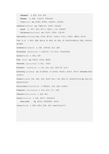
Sensation n. 感觉;轰动;感动Premise n. 前提;上述各项;房屋连地基Trashy ['træʃi]adj. 没用的;碎屑的;垃圾似的;无价值的inoffensive[inə'fɛnsɪv]adj. 不触犯人的;无害的;没恶意的Appeal n. 呼吁,请求;吸引力,感染力;上诉;诉诸裁判Spontaneous [spɑn'teniəs]adj. 自发的;自然的;无意识的Intermediary [,ɪntɚ'midɪɛri]adj. 中间的;媒介的;中途的n. 中间人;仲裁者;调解者;媒介物Thrill [θrɪl]n. 激动;震颤;紧张vt. 使…颤动;使…紧张;使…感到兴奋或激动vi. 颤抖;感到兴奋;感到紧张Installment [ɪn'stɔlmənt]n. 安装;分期付款;部分;就职Domensticity ['domɛ'stɪsəti]n. 家庭生活;专心于家务;对家庭的挚爱Coyness ['kɔɪnɪs]n. 羞怯;怕羞Overt [o'vɝt]adj. 明显的;公然的;蓄意的Potentiality [pə,tɛnʃɪ'æləti]n. 潜力;可能性Orientation [orɪɛn'teʃən]n. 方向;定向;适应;情况介绍;向东方Exhilarating [ɪɡ'zɪləretɪŋ]adj. 使人愉快的;令人喜欢的;爽快的v. 使高兴,使兴奋(exhilarate的现在分词形式)Initiate [ɪ'nɪʃɪet]vt. 开始,创始;发起;使初步了解n. 开始;新加入者,接受初步知识者adj. 新加入的;接受初步知识的Consummation [,kɑnsə'meʃən]n. 圆满成功;完成;成就;达到极点Antagonism [æn'tæɡənɪzəm] n. 对抗,敌对;对立;敌意Infatuation [ɪn,fætʃu'eʃən]n. 迷恋;醉心Intuition [,ɪntu'ɪʃən]n. 直觉;直觉力;直觉的知识Deep-seated adj. 深层的;根深蒂固的;深位的craving['krevɪŋ]n. 渴望;热望v. 渴望;恳求(crave的ing形式)。
unitTwo
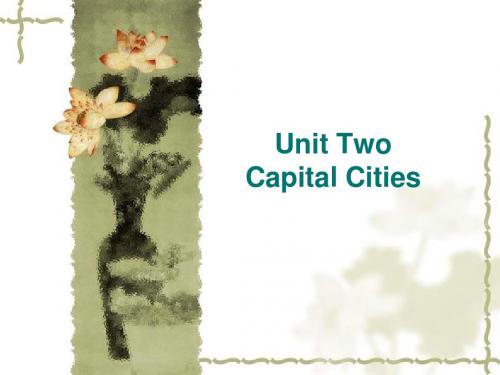
rank
vt., vi. to place in a row or rows, classify,排列, 分 类;分等级, 这城市在风景区中享有盛名。 This town ranks high among beauty spots. 杯子整齐地排列在架子上 cups ranked neatly on the shelf 他在班上名列前茅 He ranked first in the class.
imagination n. 想象, 想象力, 听觉 你没有真正看到它,这只是你的想象。 You didn't really see it — it was just your imagination. 诗人和艺术家都有想象力。 Poets and artists have imagination.
fame 意为“名气”“名望王”,强调较高的知名度 The reformer's fame spread all over the country. 这位改革者名震全国。 undying fame 不朽之名
vi., vt. a. (常与at, that连用)觉得奇怪;惊奇 我对他的粗鲁感到奇怪。 I wonder at his rudeness. b. 纳闷;想知道 他很奇怪为什么人们本可以造出漂亮的房屋, 而偏偏建造出丑陋的房子来。 He wondered why people built ugly homes, when they could have beautiful ones.
reputation
n. the opinion that people have about someone or something名声; 名誉 默默无闻的人; 没有声望的人 a man of no reputation 有信誉的人, 体面的人 a person of reputation 博得名声 build up a reputation 名誉很好的人 a man of good reputation
Unit Two综合练习
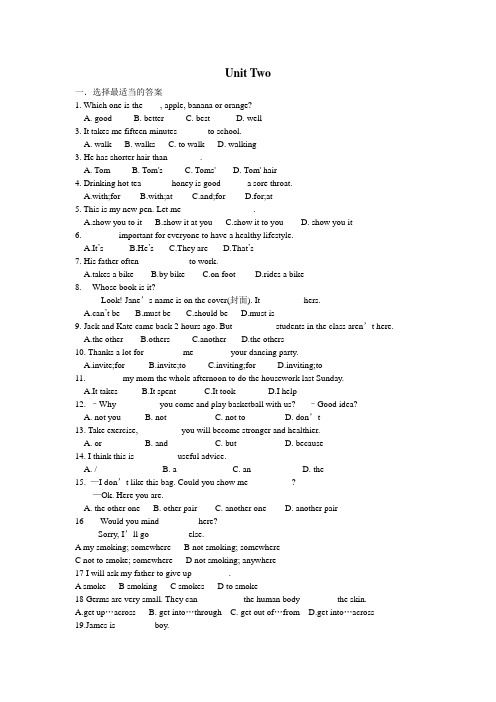
Unit Two一.选择最适当的答案1. Which one is the____, apple, banana or orange?A. goodB. betterC. bestD. well3. It takes me fifteen minutes ______ to school.A. walkB. walksC. to walkD. walking3. He has shorter hair than _______.A. TomB. Tom'sC. Toms'D. Tom' hair4. Drinking hot tea ______ honey is good _____ a sore throat.A.with;forB.with;atC.and;forD.for;at5. This is my new pen. Let me ________________.A.show you to itB.show it at youC.show it to youD. show you it6. ________important for everyone to have a healthy lifestyle.A.It’sB.He’sC.They areD.That’s7. His father often ___________to work.A.takes a bikeB.by bikeC.on footD.rides a bike8. ---Whose book is it?---Look! Jane’s name is on the cover(封面). It _________ hers.A.can’t beB.must beC.should beD.must is9. Jack and Kate came back 2 hours ago. But _________ students in the class aren’t here.A.the otherB.othersC.anotherD.the others10. Thanks a lot for ________ me ________your dancing party.A.invite;forB.invite;toC.inviting;forD.inviting;to11. ________my mom the whole afternoon to do the housework last Sunday.A.It takesB.It spentC.It tookD.I help12. –Why _________ you come and play basketball with us? –Good idea?A. not youB. notC. not toD. don’t13. Take exercise, _________ you will become stronger and healthier.A. orB. andC. butD. because14. I think this is _________ useful advice.A. /B. aC. anD. the15. —I don’t like this bag. Could you show me _________ ?—Ok. Here you are.A. the other oneB. other pairC. another oneD. another pair16 -----Would you mind ________ here?-----Sorry, I’ll go ________ else.A my smoking; somewhereB not smoking; somewhereC not to smoke; somewhereD not smoking; anywhere17 I will ask my father to give up ________.A smokeB smokingC smokesD to smoke18 Germs are very small. They can __________the human body________ the skin.A.get up…acrossB. get into…throughC. get out of…fromD.get into…across19.James is ________ boy.A.a 18-month-oldB. a 18 months oldC. an 18-month-oldD. an 18-months-old20 You kept me _______so long.A. waitingB. to waitC. am waitingD.wait21 ---Must I finish my homework before I go home?----No, you _____. But you ____finish it before tomorrow.A mustn’t; mustB needn’t; mustC must; mustn’tD needn’t;mustn’t22 As we know, ______is good exercise and it is necessary for health.A walkB to walkC walkingD walked23 My uncle says that it’s his duty ______the patients.A saveB to saveC savesD saving24 ---Could you please ______us some stories? ----Ok.A sayB talkC tellD speak25.I don’t want the black pen. I want .A.a red oneB.red oneC.one redD.red pen26.—Mike and John, did you enjoy on Children's Day?—Yes, we did. A.myself B.yourselves C.ourselves D.themselves 27.——Are we going there by bus?——,A.GreatB.SureC.SorryD.Good idea28.——Would you like to go shopping with me?—— .A.I’d likeB.I’d love toC.Yes, pleaseD.Yes, I will29.We’d better the work now.A.doB.to doC.doingD.does30.Shall we keep the window ?A.closeB.closingC.to closeD.closed31.There are people in Shanghai than in FuzhouA.much moreB.many moreC.a little moreD.many32.I’m very tired. I want to .A.eat somethingB.drink some waterC.have a restD.give a talk33.I like to hear the bird in the morningA.singingB.singsC.to singD.at singing34.There are twenty and thirty on the farm.A.sheep, deersB.sheeps deerC.sheeps, deersD.sheep, deer35.There is going to an English film this eveningA.haveB.beC.giveD.put36. delicious these moon cake are!A.How aB.What aC.HowD.What37.He he likes the moon cakes with meat in themA.talksB.speaksC.saysD.tells38.I often help him the classroomA.cleanB.cleaningC.to cleaningD.cleans39.please your new dress to me.A.showB.showsC.showedD.showing40.It’s about two metre his home.A.hundreds of , farB.hundred ,fromC.hundred of, awayD.hundreds, far from41.Don’t worry Xiao Wang.A.forB.aboutC.atD.on42.Sports and games are good your health.A.ofB.forC.atD.with43.He works very hard. He goes to bed eleven every eveningA.less thanter thanC.more thanD.much than44.—May I call you Johnson?—.A. Thank you .B. of course, if you like.C. That’s OKD. I’ve no idea45. There is no time the box now.A. openB. openingC. opensD. to open46. I don’t know when he . When he , I’ll let you know.A. returns; returns.B. will return; returns.C. returns; will return.D. will return; will return.47. —How deep is the hole?—It is .A.four meter deepB. four meters deep.C. four—meter deepD. four—meters—deep48. —Do you remember she came?—Yes , I do. She came by bike.A. thatB. whetherC. howD. when49. I used to drink a lot of coffee, these days I prefer tea.A. butB. andC. soD. Before50.—I fell just now and hurt my leg.—A.Be careful. B.It doesn't matter. C.I'm sorry to hear that. D.Nothing serious. 二.用括号中所给单词的适当形式填空1.About two-thirds of adults consult their doctor at (less) once a year.2.Make sure that you defrost(解冻)it (complete).3. How many_____ ( tooth) does the baby have now?4. He often _______ (advice) me to exercise every morning.5.______(watch) TV too much is bad for our eyes.6. Could you help me _______(make) cakes?7.Everyone in the world should keep the _______(balanced) of the nature.8.He is________(improve) his ______(speak) English these days.9.We hope you feel ________(good) later on.10.He likes to go bike ________(ride).11. My________(eat) habits are very good.12. Marin knew little Chinese, so she asked me________(translate) the sentence into English.三.从方框内选择符合的单词或短语,并用其适当形式填空popular, with, sore, sound, mile, hardly ever, by, stay, quiet, take1. —I have a throat.—You should see a doctor.2. My father often goes to school subway.3. —We are going camping tomorrow.—That cool.4. The boy is sleeping. Please keep .5.It is about 5 from here to the hospital.6. I help my father the sheep on the farm on weekends.7. I really enjoy at the beach because it is so cool and relaxing!8.Tomorrow we an important lesson so we can’t go with you. 四.改写句子1. It seems that he is always happy. (变同义句)He always ______ ________.2.I think I will learn quite a lot here. ( 变为否定句)I _______ think I ________ learn quite a lot here3.She often come to school late. (将often改为yesterday)She ________ to school late ___________.4. I watched a soccer game on TV last night. (对划线部分提问)_______ _______ you watch a soccer game on TV?5.He likes singing better than dancing. (变为同义句)He ________ singing _______ dancing.6.I think I will learn quite a lot here. ( 变为否定句)I _______ think I ________ learn quite a lot here7.The kitchen fan doesn’t work. (变为同义句)The kitchen fan ______ ________.8.Could you please do me a favor? (变为同义句)Could you please ______ _____?9.You’d better get up early, ______ _______?. (变反意疑问句)10.David is good at swimming. (变为同义句)David _____ _____ in swimming.11.My favorite player is Liu Xiang. (对划线部分提问)__________ _________your favorite player?12.I have a toothache.(对划线部分提问)__________ _________ with you ?13.Lucy is going to be a dancer. ( 改为否定句))Lucy__________ _________ _________dancer. .14. You’d better go to see your friend now.(改为否定句)You ______ ________ ________ go to se your friend now.15.She goes bicycling twice a week.(变为一般疑问句)________ she ________ bicycling twice a week?16. Ann spends at least an hour in gym every day. (对划线部分提问)_______ ________ does she spend in the gym every day?17.He likes singing better than dancing. (变为同义句)He __________ singing ________ dancing18.Reading books is a good habit. (变为同义句)It ________ good ______ read books.19.Eating too little is bad for your health. (变为同义句)Eating too little ________ ________ for your health.20. I’m the first one to reach school.I’m the first one to _________ _________ / _________ _________school. 五.作文以至少60个词描写一次你春节拜访亲友的经历。
EEC英语初二上unit2 知识点.

初二上Unit two知识点1.dark adj. darker darkest 深色的,发黑的,黑暗的,It is getting dark, we’d better hurry home.dark clouds 乌云dark blue 深蓝色 light blue浅蓝色反:bright 亮色的,明亮的 n. darknessn. 暗色 in the dark 在黑暗处Please don’t read in the dark, it’s bad for your eyes.2. cloud cn. cloudy adj. 多云的,阴天的a white cloud 一片白云 above the cloud 在云层上空There is not a cloud in the sky. 万里无云。
It’s a cloudy day.3.wind un. windy adj. windier windiesta light/soft/hot/warm/cool/fresh/strong windThere will be a strong wind in the northern part of our country tomorrow. The wind will blow strongly in the north of our country tomorrow.The wind is blowing from the south.Today is much windier than it was yesterday.4. storm n. 暴风雨,暴风雪 stormy adj.a big storm 大暴雨 a snow storm暴风雪 a sand storm 沙尘暴There was a storm last night with a strong wind and a lot of rain.Today is a stormy day.5.Inside n. 内部,里面反:outsideThe outside of the house is dirty, but the inside is clean.adj. 里面的,内部的 There is nobody inside.prep. 在…里面,在…之内 He will return inside a month.adv.在里面 Go /Come inside(=into the house6.should modal v. should +do=ought to do sth.Your room is too dirty, you should clean it.You shouldn’t swim in the river .(Don’t swim in the river.6.look for 寻找 find 找到 found ---foundlook at/over(医生检查/ up /aft er/out of…/around/likeHe looked for his pen everywhere, but he didn’t find it.7. quickly adv. 迅速地Quickly, open the door. He quickly stood up. quick adj. 快的,迅速的= in a hurryBe quick, or y ou won’t catch up the early bus.8. hide vt. (hid, hidden ,hiding 反:show把…藏起来,遮掩The black clouds hid the sun.乌云遮住了太阳。
UNIT TWO

UNIT TWO第2单元Text Taste鉴赏Taste:v.品尝, 辨味, (of)有...味道, 领略vt.体验, 感到n.味道, 味觉1、The faculty of discerning what is aesthetically excellent or appropriate.鉴赏力:辨别在美学上很出色的或适当的事物的能力2、A manner indicative of the quality of such discernment: 品味:表现出这样一种鉴别能力的方式:a room furnished with superb taste. 家具摆设风格典雅的房间[1] People who study examples of good taste can acquire good taste .研究优雅事物的人会变得优雅。
Some people are surrounded by good taste from birth . Others acquire a 有人生在优雅的环境中,有人sense of taste from teachers or knowledgeable individuals . Those who 从老师或者从知识渊博的人处获得审美意识。
那些Knowledgeable:adj.知识渊博的, 有见识的Individual:n.个人, 个体adj.个别的, 单独的, 个人的improve their taste do it by observing and perceiving objects of good想提高鉴赏力的人通过发现和观察设计精美的物品来达到目的。
Perceive:vt.察觉v. 感知, 感到, 认识到design .[2] History has placed a stamp of approval on the culture and古代埃及、希腊和罗马的文化及工艺品已得到了历史的认可,Place:[pleis]n.地方, 地点, 位置, 职位, 处境, 住所, 地位vt.放置, 寄予, 任命vi.名次列前Stamp:[stAmp]n.邮票, 印花, 印, 图章, 标志, 印记, 跺脚, 顿足v.跺(脚), 顿(足), 压印artifacts of ancient Egypt , Greece , and Rome . The periods of Louis XV法国路易十五、artifacts:n. 史前古器物and Louis XVI , as well as the designs of the Renaissance period in 十六时期以及欧洲文艺复兴时期的设计Renaissance:n.复兴, 复活, 新生, 文艺复兴, 文艺复兴时期1、A rebirth or revival. 复苏:再生或复活2、The humanistic revival of classical art, architecture, literature, and learning that originated in Italy in the 14thcentury and later spread throughout Europe. 文艺复兴:古典艺术,建筑,文学和学识的人文主义复兴,起源于14世纪的意大利,后来蔓延到整个欧洲3、The period of this revival, roughly the 14th through the 16th century, marking the transition from medieval tomodern times.文艺复兴时期:大约从14世纪到16世纪的复兴时期,标志着从中世纪到现代时期的过渡4、A revival of intellectual or artistic achievement and vigor: 复兴:文化或艺术成就或活力的复兴:the Celtic Renaissance. 凯尔特文化的复兴5、The period of such a revival. 复兴时期:这样的复兴时期Renaissance1、Of, relating to, or characteristic of the Renaissance or its artistic and intellectual works and styles.文艺复兴:关于文艺复兴或文艺复兴时期的艺术和文学作品及风格的特点的2、Of or being the neoclassic style of architecture and decoration that originated in Italy in the 15th century.新古典主义建筑及装饰风格的:源于15世纪意大利的新古典主义建筑和装饰的风格的Europe , are also rated high from the standpoint of good taste.①在良好的审美情趣方面也享有很高的地位。
PEP英语六级上册课文Unit新Two

Unit Two 第二单元Ways to go to school 怎样去上学Wait Don't go at the red light. 等等别闯红灯;Sorry. 对不起;You must pay attention to the traffic lights. 你必须注意交通灯;Good morning, John. 早上好,约翰;How do you go to school 你怎么上学I often go by subway. 我经常乘地铁;Hi, Mike. Is this your bike 嗨,迈克;这是你的自行车吗Yes. 是的;Nice 真棒Thanks How do you come to school 谢谢你怎么来学校的I usually come on foot. 我通常步行来;A Let's try 试一试 Amy meets Mike at school this morning. 艾米早上在学校遇到了迈克;Listen and tick or cross. 听,然后打勾或打叉;Morning, Mike. 早上好,迈克;Morning. 早上好;Hey, don't forget. 嘿,别忘了;Mrs Smith will take us to the nature park next Wednesday. 下周三史密斯夫人要带我们去自然公园;Oh, yes. 哦,是的;How do we get to the nature park 我们怎么去自然公园By bus. 坐公交车去;Look There's Mrs Smith now. 看史密斯夫人来了;Let's talk 谈话 Good morning, Mrs Smith 早上好,史密斯夫人Hi, children. 嗨,孩子们;You're early. 你们真早;How do you come to school 你们怎么来学校的Usually, I come on foot. 通常我步行来;Sometimes I come by bus. 有时坐公交车;I often come by bike. 我经常骑自行车来;How do you come to school, Mrs Smith 您怎么来学校,史密斯夫人By car 开车吗Sometimes, but I usually walk. 有时是,不过我通常走路来;That's good exercise. 这是很好的锻炼;How do Mike, Amy and Mrs Smith come to school 迈克、艾米和史密斯夫人怎么来学校Let's learn 学习Let's go to the nature park. 我们去自然公园吧;John: Hooray 万岁How do we get there 我们怎么去那儿By bus. 坐公交车;on foot 步行by bus 乘坐公交车by taxi 乘坐出租车by plane 乘坐飞机by ship 乘坐轮船by subway 乘坐地铁by train 乘坐火车B Let's try 试一试What does Mrs Smith tell the children to do 史密斯夫人让孩子们做什么Listen and tick. 听,并打勾;Children, let's get on the bus. 孩子们,我们上公交车吧;Yeah 好啊You should get on one by one. 你们要一个一个地上车;OK. 好的;Mrs Smith, where is Wu Yifan 史密斯夫人,吴一凡在哪儿啊He's not coming. 他不来了;His grandpa is ill. 他爷爷病了;I'm sorry to hear that. 我听了很难过;Let's talk 谈话Mr Jones, how can I get to the Fuxing Hospital 琼斯先生,我怎样可以到复兴医院呢Take the No. 57 bus over there. 去那边坐57路公共汽车;Thanks. Wow So many pictures of bikes 谢谢;哇这么多自行车照片They're from my cousin in the USA. 这是我美国的表弟拍的;What's this 这是什么A helmet. 是头盔;In the USA people on bikes must wear one. 在美国,人们骑车必须戴头盔;I see. 我知道了;Oh, the bus is coming 哦,公共汽车来了Bye, Mr Jones. 再见,琼斯先生;Hey, don't go at the red light 嘿,别闯红灯Oh, right Thanks. 哦,对了谢谢;I must pay attention to the traffic lights 我必须注意交通灯;What do you learn about riding a bike from the dialogue 从对话中,你对骑自行车有什么了解Let's learn 学习 Look The park is over there 看公园在那边Let's go 我们去吧Please wait 请等一等It's red now. 现在是红灯;We must stop and wait. 我们必须停下来等待;Slow down and stop at a yellow light. 黄灯慢行停车;Slow down 慢行stop 停止Stop and wait at a red light. 红灯停车等待;wait 等待Go at a green light. 绿灯行车;go 走-------------------Read and write 读读写写Different ways to go to school 不同方式去上学Some children go to school on foot in Munich, Germany. 在德国慕尼黑,一些孩子步行上学;In Alaska, USA, it snows a lot. 在美国阿拉斯加,雪下得很大;Some kids go to school by sled. 一些孩子乘雪橇上学;It's fast. 速度很快;Some children in Jiangxi, China, go to school by ferry every day. 在中国江西,一些孩子每天坐渡船上学;In Papa Westray, Scotland, the children go to school by ferry, too. 在苏格兰的帕帕韦斯特雷岛,孩子们也坐渡船去上学;But in 2009, they went to school by plane because the ferry didn't work. 但是在2009年,因为渡船故障,他们坐飞机去上学;Grandpa, let me read this for you. 爷爷,我来给您读书听吧;Thanks, Robin. 谢谢,罗宾;I don't go to school. 我不上学;I learn at home. 我在家里学习;Tips for pronunciation 发音方法小提示Listen, look and say. 听,看,说;come and have a look 来看一下pictures of ……的图画stop at a red light 红灯停Let's check 检查Listen and number. 听,写序号;1. Excuse me, how can I get to the park 打扰一下,我怎么走可以去公园Take the No. 25 bus. 坐25路公共汽车;Can I go on foot 我可以步行去吗No, it's too far. 不行,太远了;Go by bus. 去坐公交车吧;2. My father works near my home. 我爸爸在离家很近的地方工作;It's great. 太棒了;My father works in the city. 我爸爸在城里工作;How does he go to work 他怎么去上班Usually by train. 通常坐火车;3. Hey, Amy. School is over. 嘿,艾米;放学了;How do you go home 你怎么回家I usually go on foot. 我通常步行回家;And you By bus 你呢坐公交车吗No, I go on foot, too. 不是,我也步行回去;4. Don't cross the street now. 现在别过马路;Why 为什么There are no cars coming. 没有汽车来呀;It's a red light. 现在是红灯;Cars are very fast. 汽车速度很快;It's dangerous. 很危险;OK. 好的;Listen again and answer the questions. 再听一次,然后回答问题;1. Excuse me, how can I get to the park 打扰一下,我怎么走可以去公园Take the No. 25 bus. 坐25路公共汽车;Can I go on foot 我可以步行去吗No, it's too far. 不行,太远了;Go by bus. 去坐公交车吧;2. My father works near my home. 我爸爸在离家很近的地方工作;It's great. 太棒了;My father works in the city. 我爸爸在城里工作;How does he go to work 他怎么去上班Usually by train. 通常坐火车;3. Hey, Amy. School is over. 嘿,艾米;放学了;How do you go home 你怎么回家I usually go on foot. 我通常步行回家;And you By bus 你呢坐公交车吗No, I go on foot, too. 不是,我也步行回去;4. Don't cross the street now. 现在别过马路;Why 为什么There are no cars coming. 没有汽车来呀;It's a red light. 现在是红灯;Cars are very fast. 汽车速度很快;It's dangerous. 很危险;OK. 好的;What will the woman do 女子会怎么做C Story time 故事时间 It's so good to see you, Annie 很高兴见到你,安妮You too, Amy.见到你也很高兴,艾米;I missed you. 我很想你;Wow, Chinese food is so different from British food. 哇,中餐和西餐真不一样; Yes. Can you use chopsticks 是的;你会用筷子吗No, I can't. 我不会;Let's take a bus home. 我们坐公交车回家吧;We must cross the road. 我们要过马路;In the UK you drive on the left side. 在英国,开车要走左边;In China, people drive on the right side. 在中国,人们开车要走右边;I see. 我明白了;We must look right before crossing the road. 过马路前,我们要先看右边;No, first left and then right 不对,先左边再右边Look, the bus is over there 看,公共汽车在那边;Wow, it's a double-decker 哇,是双层汽车;The same as in London. 和伦敦的一样;Where is the door 车门在哪儿Amy, there is no door on the bus 艾米,公共汽车没有车门Haha, you're looking at the wrong side again 哈哈,你又看错方向了;Songs in each unit 单元歌曲Unit 2 第二单元How do you get there 你怎么去那里You go by subway, 你坐地铁去,And I'll go by taxi. 我坐出租车;And I'll be at school before you. 我会比你先到学校;You go by airplane, 你坐飞机去,And I'll go by a big ship. 我坐大轮船;And I'll be in Scotland before you. 我会比你先到苏格兰;You go by subway,And I'll go by taxi.And I'll be at school before you.You go by airplane,And I'll go by a big ship.And I'll be in Scotland before you.Now it's your turn. 现在轮到你了;You go by subway, 你坐地铁去,And I'll go by taxi. 我坐出租车;And I'll be at school before you. 我会比你先到学校;You go by airplane, 你坐飞机去,And I'll go by a big ship. 我坐大轮船;And I'll be in Scotland before you. 我会比你先到苏格兰;You go by subway,And I'll go by taxi.And I'll be at school before you.You go by airplane,And I'll go by a big ship.And I'll be in Scotland before you.Useful express-ions 常用表达法Unit 2 第二单元How do you come to school 你怎么来学校的Usually, I come on foot. 通常我走路来;In the USA people on bikes must wear one. 在美国骑自行车的人必须戴头盔;Don't go at the red light 别闯红灯I must pay attention to the traffic lights 我必须注意交通信号灯Proverbs 谚语Unit 2 第二单元Horses for courses. 萝卜白菜各有所爱;-------------------Words in each unit 单元词汇表Unit 2 第二单元on foot 步行by 表示方式乘bus 公共汽车plane 飞机taxi 出租汽车ship 大船subway 地铁train 火车slow 慢的down 减少;降低slow down 慢下来stop 停下Mrs 夫人early 早到的helmet 头盔must 必须wear 戴attention 注意pay attention to 注意traffic 交通traffice lights 交通信号灯Munich 慕尼黑德国城市Germany 德国Alaska 阿拉斯加州美国州名sled 雪橇fast 快的ferry 轮渡Papa Westray 帕帕韦斯特雷岛Scotland 苏格兰。
Unit_Two第一次课

Quotes
Live as if you were to die tomorrow. Learn as if you were to live forever. ---Mahatma Gandhi
珍惜生活,就象死神即将来临; 热爱学习,就象生命能够永恒。
Quotes
There are only two ways to live your life. One is as though nothing is a miracle. The other is as though everything is a miracle. ---Albert Einstein
condemn
vt. 谴责;判刑 定…罪,判…刑(尤指死刑): be condemned to death
谴责某人所做的事 condemn sb for sth 谴责干涉 condemn the interference in
sphere 范围;球体
sphere of application: 适用范围 sphere of influence: 势力范围;影响范围
通常情况下
under/in … circumstances 在…情况下
under normal circumstances
决不;在任何情况下都不
under no circumstances in no case
e.g.中国政府一再重申,在任何情况下,中国将不首先 使用核武器。
Beijing has reiterated that under no circumstances will China use/employ nuclear weapons first.
UNIT TOW

Unit Two The United Kingdom1. How many countries does the UK consist of? 英联合王国由几个国家组成?关键透析consist of 由……组成,由……构成。
Great Britain consists of England, Scotland, Ireland and Wales.英国由英格兰、苏格兰、爱尔兰和威尔士组成用consist of时,整体在前,个体在后,句子用主动。
易混辨析:make up; make up of 和consist of都表示“组成;构成”。
make up用法归纳:(1)编造Can you make up a sentence with “make up”? 你能用make up造个句子吗?Don’t make up an excuse to me. 别对我编借口。
(2)组成;构成England, Scotland, Ireland and Wales make up Great Britain.英格兰、苏格兰、爱尔兰和威尔士组成大不列颠。
Fifty students make up our class. 五十个学生组成我们班。
易混辨析:make up; make up of 和consist of都表示“组成;构成”。
用make up时,个体在前,整体在后,句子用主动。
用make up of时,整体在前;个体在后,句子用被动。
Great Britain is made up of England, Scotland, Ireland and Wales.英国由英格兰、苏格兰、爱尔兰和威尔士组成用consist of时,整体在前,个体在后,句子用主动。
Great Britain consists of England, Scotland, Ireland and Wales.英国由英格兰、苏格兰、爱尔兰和威尔士组成(3)弥补Students must make up the lesson they missed. 学生们应该把落下的课补上。
unit two 答案和详解

“Growing populations will worsen problems with water,” says Peter H. Gleick, an environmental scientist at the Pacific Institute for studies in Development, Environment, and Security, a research organization in California. He fears that by the year 2025, as many as onethird of the world’s projected 8.3 billion people will suffer from water shortages.
Will We Run Out of Water?
Picture a “ghost ship” sinking into the sand, left to rot on dry land by a receding sea. Then imagine dust storms sweeping up toxic pesticides and chemical fertilizers from the dry seabed and spewing them across towns and villages.
人教版六年级上册英语unit2解析

人教版六年级上册英语unit2解析Unittwo:Ways to go to school第二单元:去学校的方式1、Wait! Don't go at the red light!等一下!不要闯红灯!Sorry.对不起。
You must pay attention to the traffic lights.你必须注意交通信号灯。
Good morning, John.How do you go to school?早上好,约翰。
你怎么来学校?I often go by subway.我经常乘地铁。
Hi, Mike. Is this your bike?嗨,迈克。
这是你的自行车吗?Yes.是的。
Nice!漂亮!Thanks. How do you come to school?谢谢。
你怎么来学校?I usually come on foot.我通常步行来学校。
How do/does+主语+come/go to ...?第三人称用does,其他用do例:How do you come to school?你怎么来学校?How does Amy come to school?艾米怎么来学校?always总是频率100%I always go to school on foot.我总是走路去学校。
usually通常频率80%I usually play football on weekend.我周末经常踢足球。
often经常频率50%He often does his homework on Saturday.他经常在星期六写作业。
sometimes有时,频率20%Sometimes she goes shopping with her mother.她有时和她妈妈一起购物。
never从不,频率0%He is never late for school.他上学从来不迟到2、Let's try让我们试试听力材料Amy:Morning, Mike.艾米:早上好,迈克。
- 1、下载文档前请自行甄别文档内容的完整性,平台不提供额外的编辑、内容补充、找答案等附加服务。
- 2、"仅部分预览"的文档,不可在线预览部分如存在完整性等问题,可反馈申请退款(可完整预览的文档不适用该条件!)。
- 3、如文档侵犯您的权益,请联系客服反馈,我们会尽快为您处理(人工客服工作时间:9:00-18:30)。
Unit TwoTextPresenting a SpeechStephen LucasPre-readingDiscuss the following topics with your partner before reading the text.1. Have you ever presented an English speech in front of a crowd?2. Were you satisfied with your speech?3. What are the most important things you should pay attention to before and during yourspeech?4. As for an academic speech in English, what do you think you should do to prepare?1. Of all human creations, language may be the most remarkable. Through language we share experiences, formulate values, exchange ideas, transmit knowledge, and sustain culture. Indeed, language is vital to thinking itself. Contrary to popular belief, language does not simply mirror reality but also helps to create our sense of reality by giving meaning to events.2. Good speakers have respect for language and know how it works. Words are the tools of a speaker's craft. They have special uses, just like the tools of any other profession. As a speaker, you should be aware of the meanings of words and know how to use language accurately, clearly, vividly, and appropriately.3. Using language accurately is as vital to a speaker as using numbers accurately is to an accountant. Never use a word unless you are sure of its meaning: If you are not sure, look up the word in a dictionary. As you prepare your speeches, ask yourself constantly, "What do I really want to say? What do I really mean?" Choose words that are precise and accurate.4. Using language clearly allows listeners to grasp your meaning immediately. You can ensure this by using familiar words that are known to the average person and require no specializedbackground; by choosing concrete words in preference to more abstract ones, and by eliminating verbal clutter.5. Using language vividly helps bring your speech to life. One way to make your language more vivid is through imagery, or the creation of word pictures. You can develop imagery by using concrete language, simile, and metaphor. Simile is an explicit comparison between things that are essentially different yet have something in common; it always contains the words "like" or "as." Metaphor is an implicit comparison between things that are different yet have something in common; it does not contain the words "like" or "as."6. Another way to make your speeches vivid is by exploiting the rhythm of language. Four devices for creating rhythm are parallelism, repetition, alliteration, and antithesis. Parallelism is the similar arrangement of a pair or series of related words, phrases, or sentences. Repetition is the use of the same word or set of words at the beginning or end of successive clauses or sentences. Alliteration comes from repeating the initial consonant sounds of close or adjoining words. Antithesis is the juxtaposition of contrasting ideas, usually in parallel structure.7. Using language appropriately means adapting to the particular occasion, audience, and topic at hand. It also means developing your own language style instead of trying to copy someone else's. If your language is appropriate in all respects, your speech is much more likely to succeed.8. Good speeches are not composed of hot air and unfounded assertions. They need strong supporting materials to bolster the speaker's point of view. In fact, the skillful use of supporting materials often makes the difference between a good speech and a poor one. The three basic types of supporting materials are examples, statistics and testimony.9. In the course of a speech you may use brief examples—specific instances referred to in passing -- and sometimes you may want to give several brief examples in a row to create a stronger impression. Extended examples -- often called illustrations, narratives, or anecdotes -- are longer and more detailed. Hypothetical examples describe imaginary situations and can be quiteeffective for relating ideas to the audience. All three kinds of examples help to clarify ideas, to reinforce ideas, or to personalize ideas. To be more effective, though, they should be vivid and richly textured.10. Statistics can be extremely helpful in conveying your message, as long as you use them sparingly and explain them so they are meaningful to your audience. Above all, you should understand your statistics and use them fairly. Numbers can easily be manipulated and distorted. Make sure that your figures are representative of what they claim to measure, that you use statistical measures correctly, and that you take statistics only from reliable sources.11. Testimony is especially helpful for student speakers, because they are seldom recognized as experts on their speech topics. Citing the views of people who are experts is a good way to make your ideas more credible. When you include testimony in a speech, you can either quote someone verbatim or paraphrase their words. As with statistics, there are guidelines for using testimony. Be sure to quote or paraphrase accurately and to cite qualified unbiased sources. If the source is not generally known to your audience, be certain to establish his or her credentials.12. The impact of a speech is strongly affected by how the speech is delivered. You cannot makea good speech without having something to say. But having something to say is not enough. You must also know how to say it. Good delivery does not call attention to itself. It conveys the speaker's ideas clearly, interestingly, and without distracting the audience.13. There are four basic methods of delivering a speech: reading verbatim from a manuscript, reciting a memorized text, speaking with PowerPoint, and speaking extemporaneously, or impromptu. The last of these -- speaking extemporaneously is the method you probably will use for classroom speeches and for most speeches outside the classroom. When speaking extemporaneously, you will have only a brief set of notes or a speaking outline. Speaking with PowerPoint is widely used now and very effective indeed.14. Certainly there are other factors you should consider, such as personal appearance, bodilyaction, gestures, eye contact, volume, pauses and so on. By paying enough attention to what is mentioned above, you may present an effective speech.ExercisesⅠ. Comprehension QuestionsA Getting informationl. Through language people can 1) ; 2) ; 3) ;4) ; 5) .2. As a speaker, you should know how to use language 1) ; 2) ;3) ; 4) .3. The four devices for creating rhythm effectively are 1) ; 2) ;3) ; 4) ;.4. The three basic types of supporting materials are 1) ; 2) ;3) ; 4) .5. The four basic methods of delivering a speech are 1) ; 2) ;3) ; 4) .B Answer the following questions, and then write them out in the spaces provided below.l. What does the author mean by using language clearly?2. How can you make your speech vivid according to the author?3. In the author's opinion, what can make the difference between a good speech and a poor one?4. According to the author, how to make your speech very effective?5. What else should a speaker pay attention to in addition to what the author discussed in the previous paragraphs?C Choose the best answer to each question below.1. Which of the following about language is true according to the author?A. It can be regarded as a tool of exploiting the rhythm of language.B. It mirrors reality and also helps to create our sense of reality.C. It can create our imaginary about any event around us.D. It can help us to be aware of the meanings of words.2. What is true about good speakers, according to the author in Paragraph 2?A. They have respect for language and know how it works.B. They like to talk as much as possible in public.C. They must be professors or people who are well educated.D. They must have special talents in talking to others.3. Why did the author cite the example of an accountant using numbers accurately in Paragraph 3?A. He wanted to indicate the importance of language to an accountant.B. He was describing the difference between two occupations.C. He wanted to make accountants better understood.D. He was trying to stress the importance of using language accurately.4. When you use statistics in your speech, what should you pay attention to?A. You should be able to measure the statistics properly.B. They should be good enough to be manipulated and changed.C. You should get the statistics from reliable sources.D. They should be large enough to be impressive and surprising.5. What does "using language appropriately" mean?A. It means that your language should be vivid and interesting to your audience.B. It means that your language should adapt to the particular occasion, audience, and topic.C. It means that you should develop your own language and your own style.D. It means that you should not copy someone else's language.Ⅱ. VocabularyA Choose one word or phrase from the given list to fill in the blanks in the following sentences.Change the form where necessary.assertion contrary to look up implicit at hand in the course ofadapt sustain unbiased rhythm clutter metaphor1. what they predicted, the disease broke out and killed thousands of people.2. Without receiving her reply as scheduled, he regarded it as acceptance.3. He repeated his that he was not guilty in front of the jury in court.4. Using the Internet, he was able to information on a terrible disease torturing his wife.5. The young man well to the city life and his new environment.6. There is not enough oxygen in the Moon's atmosphere to plant life.7. When you prepare for your speech, be sure to cite qualified sources.8. children's language acquisition, adults should pay attention to grammar.9. It is known to all Arabic children that "ship of the desert" is a for the camel.10. is one of the things you should try to eliminate when you make a speech.B From the list given below, choose the word which is closest in meaning to the underlinedword or phrase in each sentence.1. The government decided to take concrete steps to support its faltering economy.( )2. The evidence he presented at the meeting was reliable, according to his viewpoint. ( )3. At the conference, he made an unprepared speech, which left a deep impression on every participant. ( )4. Experts warn that mankind should use natural resources economically. ( )5. An interesting story about Albert Einstein was rewritten and published in the Readers' Digest.( )6. He needs to build up his proof of his abilities and experience with his colleagues in biological research. ( )7. Winning the scholarship is evidence, of her intelligence in the field of physics. ( )8. The medical students were asked how they would treat a supposed case and were marked according to their responses. ( )9. Students should learn how to quote other people's statements and also how to restate them. ( )10. The photographer used a side-by-side position of fat and thin models to demonstrate the beauty. ( )ⅢTranslationA Translate the following sentences into Chinese.1. Through language we can share experiences, formulate values, exchange ideas, transmit knowledge, and sustain culture.2. Metaphor is an implicit comparison between things that are different yet have something in common.3. In fact, the skillful use of supporting materials often makes the difference between a good speech and a poor one.4. To be more effective, though, the examples you cite for your speech should be vivid and richly textured.5. Extended examples--often called illustrations, narratives, or anecdotes -- are longer and more detailed.6. Hypothetical examples describe imaginary situations and can be quite effective for relating ideas to the audience.7. Statistics can be extremely helpful in conveying your message, as long as you use them sparingly and explain them so they are meaningful to your audience.8. Citing the views of people who are experts is a good way to make your ideas more credible.9. Words are the tools of a speaker's craft. They have Special uses, just like the tools of any other profession.10. There are four basic methods of delivering a speech: reading verbatim from a manuscript, reciting a memorized text, speaking with PowerPoint, and speaking extemporaneously orimpromptu.B Translate the following passage into Chinese.Outlines are essential to effective speeches. By outlining, you make sure that related ideas are together, that your thoughts flow from one to another, and that the structure of your speech is coherent. You will probably use two kinds of outlines for your speeches -- the detailed preparation outline and the brief speaking outline.In a preparation outline, you should state your specific purpose and central idea, and identify main points and sub-points using a consistent pattern. The speaking outline should consist of brief notes to help you while you deliver the speech. It should contain key words or phrases to bolster your memory. In making up your speaking outline, follow the same visual framework used in your preparation outline. Keep the speaking outline as brief as possible and be sure it is plainly legible.C Translate the following sentences into English, using the words and phrases in brackets. Make additions or changes where necessary.1. 年青一代需要继续传承和发扬我们优良的传统和悠久的文化。
